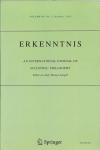
"Panqualityism, Awareness and the Explanatory Gap"
(Pankvalitismus, uvědomění a explanační mezera)
Článek kriticky pojednává o pankvalitismu, formě russelliánského monismu, zastávané např. Samem Colemanem, podle níž je vědomí konstituováno „kvalitami“, tj. nezakoušenými qualii. Autor ukazuje, že Chalmersova kritika pankvalitismu není přesvědčivá, neboť spoléhá na sporný předpoklad fenomenálního rozměru uvědomění (awareness). Předkládá vlastní kritiku pankvalitismu, která se tomuto předpokladu vyhýbá, a ukazuje, že pankvalitismus čelí „explanační mezeře“, neboť se mu nedaří vysvětlit náš bezprostřední a bohatý kognitivní přístup k zakoušeným kvalitám.

“Le débat entre Leibniz et Clarke sur la détermination de la volonté”
("Diskuse mezi Leibnizem a Clarkem o determinaci vůle")
Problematika determinace vůle je obvykle považována za velmi důležitou k tomu, abychom porozuměli přinejmenším dvěma důležitým tématům u Leibnize: jeho pojmu principu dostatečného důvodu a jeho názoru na povahu prostoru. Uvedený problém je zkoumán ve svém historickém a filosofickém kontextu. Esej byl publikován ve zvláštním čísle časopisu.
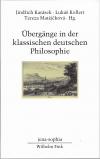
“Hegel gegen Spinoza. und gegen Hegel: Hegels späte Kritik an der Substanzphilosophie und sein eigener Übergang von der ‘Substanz’ zum ‘Subjekt’”
(Hegel proti Spinozovi ... a proti Hegelovi. Hegelova pozdní kritika substanční filosofie a jeho vlastní přechod od „substance“ k „subjektu“)
Kapitola analyzuje Hegelovu recepci Spinozy a ukazuje, jak Hegel včlenil subjektivitu do metafyziky na způsob Spinozy v závěru svého jenského období. Kapitola je součástí autorova dlouhodobého publikačního projektu o vývoji Hegelovy dialektické metody.
In: Karásek, J., Kollert, L. a Matějčková, T. (vyd.), Übergänge in der klassischen deutschen Philosophie. Leiden: Wilhelm Fink, 2019, s. 169–192.
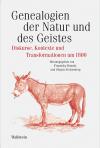
“Bildung des Menschen und Bildung des Geistes bei Hegel: Eine Erörterung mit Blick auf den Humanismus (Humboldt und Herder)”
(Kultivace člověka a kultivace ducha u Hegela. Výklad s ohledem na humanismus [Humboldt, Herder])
Kapitola analyzuje Hegelův pojem Bildung (kultivace) a ukazuje jeho odlišnosti od známých a populárních pojmů Bildung u Humboldta a Herdera. Kapitola navazuje na dlouhodobý zájem autora o všechny otázky spjaté s pojmem Bildung a s teorií moderní univerzity.
In: Bomski, F. a Stolzenberg, J. (eds.), Genealogien der Natur und des Geistes: Diskurse, Kontexte und Transformationen um 1800. Göttingen: Wallstein Verlag, 2018, s. 257–272.

“Benjamin Constant and the Ideas of Republicanism”
(Benjamin Constant a ideje republikanismu)
Stať byla publikována v monotematickém čísle o republikanismu. Oproti standardní interpretaci Constantovy politické teorie jako čistě liberální, autorka tvrdí, že interpretace Constantova chápání politiky musí vzít do úvahy jeho názory, jak je vyjádřil ve spise De la religion. Autorka zastává názor, že Constant rozvinul své pojetí občanského republikanismu tím, že zdůraznil morálku (založenou na našich vášních) a občanskou angažovanost jako hlavní prostředky ochrany lidské svobody.
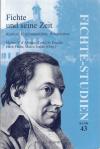
“‘Soll man ihm das glauben?’ Zu Fichtes Auseinandersetzung mit dem Schulzeschen Skeptizismus in ‘Aenesidemus-Recension’”
(Má mu to člověk věřit? K Fichtově polemice se Schulzeho skepticismem v recenzi Aenesidema)
Účelem této kapitoly bylo zkoumat vliv skepticismu na Fichta. Byla publikována v monotematickém čísle Fichte-Studien (Brill/Rodopi).
In: D’Alfonso, V., and De Pascale, C., and Fuchs, E., a Ivaldo, M. (eds.), Fichte und seine Zeit: Kontext, Konfrontationen, Rezeptionen. Leiden: Brill, 2016, s. 39–51.
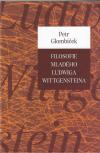
Filosofie mladého Ludwiga Wittgensteina
Interpretace Wittgensteinovy první a jediné knihy, Tractatus logico-philosophicus představuje Wittgensteina převážně jako Schopenhaueriána poučeného jazykovou analýzou. To ho přivedlo k rozlišení mezi tím, co může být řečeno slovy a tím, co může být ukázáno použitím slova.
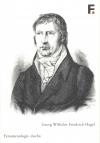
Georg Wilhelm Friedrich Hegel, Fenomenologie ducha
(Georg Wilhelm Friedrich Hegel, The Phenomenology of Spirit)
This work, which was conceived by Hegel as an introduction to his philosophical system and, at the same time, as its justification, grew into a unique presentation of the system itself. It influenced European intellectual history and philosophical learning in various subject-areas. The translation draws on the academic edition of 1980, taking from it notes, which are complemented by the classical notes of Georg Lasson, as well as by the translators’ own notes. The translation has developed out of an originally-projected critical revision of Jan Patočka’s 1960 translation.
This publication received an award for best translation of a scientific book from the Academia publishing house in 2020.
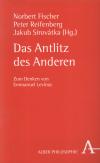
Das Antlitz des Anderen. Zum Denken von Emmanuel Levinas
(The Face of the Other: On the thinking of Emmnanuel Levinas)
Levinas develops his fundamental philosophical considerations from the concrete encounter with the other, who in his radical otherness places an ethical demand on the ego. This claim is particularly evident in the face and gaze of the other. Thus the “face of the other” belongs to the central figures of thought of Levinas’ philosophy. This anthology unfolds the core motif of the “face” in different directions (e. g. in conversation with philosophical tradition) and at the same time shows its effect in various fields: in art or in the “political”.
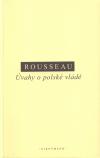
Jean-Jacques Rousseau, Úvahy o polské vládě a o její zamýšlené reformě
(Jean-Jacques Rousseau, Considerations on the Government of Poland and on Its Projected Reformation)
Considerations on the Government of Poland is the last political work by J.-J. Rousseau, it was published for the first time only after his death. Rousseau wrote the Considerations in a response to the request of the members of the revolted Polish nobility to propose a reform of the Polish Constitution. In this work Rousseau discusses the possibility of the survival of the Polish nation face to the disappearance of the Polish state. In this regard, Rousseau anticipates the national movements and demonstrates the originality of his political thought. The numerous references to the Social Contract contained in the Considerations prove the unity of his political theory as well as the strength and ardour of his convictions even in his last years. The book contains the notes of the author and the translator as well as the index, bibliography and a short survey of political the situation in the 18th century Poland. This is the first Czech translation of this work.




